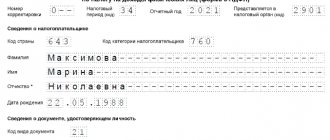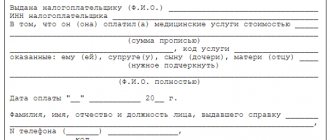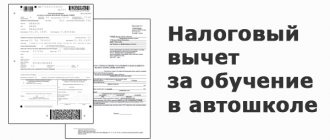Innovations
Innovations have been introduced into the Tax Code of the Russian Federation, providing for a simplified procedure for obtaining tax deductions for personal income tax:
- Property.
- Investment.
Those wishing to take advantage of the innovation will not need to:
- fill out a declaration in form 3-NDFL;
- collect supporting documents.
The tax office, having received information from banks performing the function of tax agents:
- Notify you of your right to receive a deduction.
- Will offer to approve the application.
Previously, until the taxpayer independently applied for a deduction and collected a package of supporting documents, the state did not return the money to him.
Low interest cash loan
Apply now
Tax deduction: statute of limitations
Taxpayers need to remember that each deduction has its own “statute of limitations”, i.e. the period after which the right to a tax deduction may be lost.
For example, for social and property deductions this period is 3 years. This means that you can claim a deduction, for example, for 2019 no later than 2022, and the declaration is submitted specifically for 2022, in which the corresponding expenses were incurred.
There is no statute of limitations for some deductions.
Thus, a property deduction when purchasing a home can be declared to the Federal Tax Service any number of years after the date of purchase, but it will be possible to return personal income tax only for the last 3 years. You can find more complete information on the topic in ConsultantPlus. Free trial access to the system for 2 days.
Step-by-step algorithm of actions
Taxpayer:
- Pays through a bank connected to the service for providing tax deductions for personal income tax in a simplified manner:
- purchase of real estate;
- mortgage;
- opens an individual investment account (IIA).
- At the end of the year, the bank will transmit information about the expenses incurred by the client to the Federal Tax Service.
- Federal Tax Service:
- organizes a desk audit of the received reports;
- sends a pre-filled application to the taxpayer’s personal account.
- The taxpayer decides to take advantage of the offer and signs the application.
Please note that the application from the Federal Tax Service will appear in your personal account:
- no later than March 20, if information from the bank was submitted before March 1;
- after 20 days from the date of provision of information, if they were provided by the bank after March 1.
When spending on charity
If an individual transfers part of his income to charitable organizations, socially oriented NPOs, then he has the right to claim tax benefits. The amount of such a benefit should not exceed a quarter of the taxpayer's income, and the balance of unrefunded tax cannot be carried forward to another period. An individual applying for it must have the status of a resident of the Russian Federation, that is, be in Russia for at least 183 days for 12 consecutive months.
To receive a preference, you will need to confirm expenses for charity; the legislation does not have a strict list of what documents are needed for social deductions for charity, but, based on the logic of constructing the regulatory framework, you will need:
- documents confirming payments: payment orders, receipts, acceptance certificates, etc.;
- contracts and agreements for donations;
- documents confirming the status of the recipient and the purpose of the donation (charter, other constituent documents, budget estimates, etc.).
To provide benefits, all of the listed documents are required, since they together confirm the cost goals.
IMPORTANT!
A deduction for charity is provided in the amount of expenses actually incurred, but not more than 25% of taxable income for the year.
Calculation example:
During the year, the employee transferred 120,000 rubles to a charity organization.
His annual salary was 450,000 rubles.
As already mentioned, according to the rules, he has the right to “offset” no more than a quarter of his income, that is, no more than 112,500 rubles.
We calculate personal income tax for the year: (450,000 - 112,500) * 13% = 43,875 rubles.
The employer has already deducted 58,500 rubles of income tax from his salary for the year. This means that the employee will receive a difference of 14,625 rubles.
To do this, you must send an application for a social tax deduction to the Federal Tax Service and attach to it:
- declaration 3-NDFL;
- certificate 2-NDFL from the employer;
- documents confirming transfers to charity.
After reviewing the documents, tax officials will either decide to refund the tax or refuse it, indicating the reasons.
Please note that from 01/01/2022, new tax refund application forms and notifications from the Federal Tax Service to the employer about the employee’s right to social benefits will be applied. They were approved by order of the Federal Tax Service dated August 17, 2021 No. ED-7-11/ [email protected]
When initiative is not needed
Taking advantage of the innovation that gives you the right to deduct tax in a simplified manner, you do not need to do anything:
- nor collect documents;
- nor apply to the Federal Tax Service.
It is necessary on March 20 of the following year after the transaction remotely without reference to time and place:
- Go to the website nalog.gov.ru.
- Login to the personal account of an individual:
- by login (TIN) and password;
- through State Services.
- Receive a pre-filled application to receive tax deductions for personal income tax in a simplified manner.
- Sign the application.
It should be borne in mind that the joining of banks to information interaction with banks is carried out on a voluntary basis. Therefore, when concluding an agreement to purchase property or maintain an individual investment account, check whether the bank is included in the list of tax agents.
Cash loan up to 7.5 million.
Apply now
Guide to the Standard Child Deduction
A selection of current problems when providing deductions.
How is the child tax deduction provided?
According to paragraphs.
4 paragraphs 1 art. 218 of the Tax Code of the Russian Federation, the standard tax deduction for each month of the tax period applies to the parent, spouse of the parent, adoptive parent, who support the child. A tax deduction is made for each child under the age of 18, as well as for each full-time student, graduate student, resident, intern, student, cadet under the age of 24.
Standard tax deductions established by paragraphs. 4 paragraphs 1 art. 218 of the Tax Code of the Russian Federation are provided to the taxpayer for each month of the tax period by reducing the tax base in each month of the tax period by the corresponding established amount of the deduction.
The tax base is reduced from the month of birth of the child (children) or from the month in which the adoption took place, guardianship (trusteeship) was established, or from the month of entry into force of the agreement on the transfer of the child (children) to be raised in a family until the end of that year, in in which the child (children) has reached the age specified in paragraph.
12 of this subparagraph, or the agreement on the transfer of the child (children) to be raised in a family has expired or been terminated early, or the death of the child (children).
Is a tax deduction provided to a parent if his child is in a boarding school?
When determining the tax base for personal income tax, taxpayers-parents who support their children have the right to receive a standard tax deduction.
The presence of children in a boarding school during their education does not mean that they are not supported by their parents. Accordingly, parents are entitled to the standard child tax credit on personal income taxes if they incur qualifying expenses to provide for the children. (see Letter of the Ministry of Finance of the Russian Federation dated November 9, 2018 No. 03-04-05/80485).
What documents can be used to confirm that a parent (parent’s spouse) is paying expenses to provide for the child?
In accordance with paragraph 3 of Art.
218 of the Tax Code of the Russian Federation, standard tax deductions are provided to the taxpayer by one of the tax agents who are the source of payment of income, at the taxpayer’s choice based on his written application and documents confirming the right to such tax deductions. Article 99 of the RF IC establishes that an agreement on the payment of alimony (the amount, conditions and procedure for paying alimony) is concluded between the person obliged to pay alimony and its recipient, and in the event of incapacity of the person obligated to pay alimony and (or) the recipient of alimony - between legal representatives of these persons.
By virtue of Art. 100 of the RF IC, an agreement on the payment of alimony is concluded in writing and is subject to notarization.
Failure to comply with the statutory form of the agreement on the payment of alimony entails the consequences provided for in paragraph 3 of Art. 163 of the Civil Code of the Russian Federation - its insignificance.
Based on the norms of the Tax Code of the Russian Federation and Letter of the Ministry of Finance of the Russian Federation dated January 15, 2019 No. 03-04-05/1233, the basis for providing a standard tax deduction to parents who do not pay child support by court decision, but have expenses for children, is an agreement to pay alimony.
The Letter of the Ministry of Finance of the Russian Federation dated November 7, 2018 No. 03-04-05/80099 states that documents to confirm the right to receive a standard tax deduction for children, in particular, can be copies of birth certificates of children, a copy of a passport (with a mark of marriage registration between parents) or a copy of the marriage registration certificate, a writ of execution (court order) for the collection of alimony or a notarized agreement on the payment of alimony, documents confirming the payment of alimony.
If a parent does not transfer child support on the basis of a court decision (on a writ of execution) or on the basis of a notarized agreement, while independently bearing the costs of maintaining the child, documents confirming the expenses incurred by him will be:
- copies of cash receipts, receipts, contracts issued to this person in favor of the child, etc.;
- documents confirming expenses for the child, including a written statement from the ex-wife (child’s mother) that the child’s father is involved in providing for him.
In general, a divorced parent can receive a standard child deduction if they can prove that they have paid child support (payment documents).
The employee’s application is accompanied by: copies of the child’s birth certificate, copies of a notarized agreement on the payment of alimony and copies of documents confirming the expenses incurred by him.
Thus, since the right to receive a standard tax deduction arises for the taxpayer, provided that the taxpayer is a parent and the child is supported by him, we believe that without a notarized agreement to pay child support, a standard tax deduction is not provided to such a person.
Based on the above, if the child’s father is divorced and does not actually live with the child, then documents to confirm his right to receive a standard tax deduction, in particular, may be:
- a copy of the child's birth certificate;
- certificate from the child’s place of study;
- documents confirming the fact of transfer of funds to support the child. Such documents may be payment documents (receipts for cash receipts, cash register receipts, payment orders, bank statements, etc.) confirming expenses incurred for the child;
- a written statement from the ex-wife (mother of the child) that the father is involved in providing for the children.
How is the child tax deduction provided to parents who are in an unregistered marriage?
With regard to the provision of a standard tax deduction in the event that the parents are in an unregistered marriage, in order to receive a standard deduction, the fact of registration of the marriage between the parents who support the child does not matter (letter of the Ministry of Finance of the Russian Federation dated May 30, 2011 No. 03-04-06/ 1-125, dated 08/12/2010 No. 03-04-05/5-448).
For example, with regard to an unregistered marriage, the Letter of the Ministry of Finance of the Russian Federation dated January 29, 2014 No. 03-04-05/3300 states that if paternity in relation to parents who are not married to each other was established in the manner prescribed by Art. 48 and 49 of the RF IC, for the purposes of applying the double standard tax deduction it does not matter.
Let us recall that according to para. 7 pp. 4 paragraphs 1 art. 218 of the Tax Code of the Russian Federation, a double tax deduction for personal income tax is provided to the only parent (adoptive parent), guardian, trustee. The provision of the specified tax deduction to the only parent ceases from the month following the month of his marriage.
From the Letter of the Ministry of Finance of the Russian Federation dated July 24, 2009 No. 03-04-06-01/192 it follows that the birth of a child to parents who are not in a registered marriage does not mean that the child does not have a second parent, that is, that the child has a single parent. Therefore, such cases do not fall within the scope of paragraph. 7 pp. 4 paragraphs 1 art. 218 Tax Code of the Russian Federation.
Thus, parents who are not married are entitled to a standard tax deduction if the child is supported by them while living with them, that is, they bear the costs of maintaining such a child.
The Letter of the Ministry of Finance of the Russian Federation dated November 7, 2018 No. 03-04-05/80099 states that the fact of cohabitation of a spouse with the child of the spouse from the first marriage can be confirmed:
- or a certificate from the place of residence of the relevant housing maintenance organization (Unified Information and Settlement Center);
- or a certificate from a homeowners association, housing or housing construction cooperative;
- or a certificate from the city settlement and rural administration, and can also be established in court.
An employee of the institution provided a certificate from the child’s place of study in April, and in the period from January to March the standard deduction was not provided. Can an employer provide a deduction from January?
According to paragraphs.
4 paragraphs 1 art. 218 of the Tax Code of the Russian Federation, an employee may be provided with a standard deduction for a child student, as well as for a child studying full-time, a graduate student, a resident, an intern, or a cadet under the age of 24. In accordance with paragraph 3 of Art. 218 of the Tax Code of the Russian Federation, standard tax deductions are provided to the taxpayer by one of the tax agents who are the source of payment of income, at the taxpayer’s choice based on his written application and documents confirming the right to such tax deductions.
One of the supporting documents for providing a standard tax deduction for each full-time student, graduate student, resident, intern, student, cadet aged 18 to 24 years is a certificate from an organization engaged in educational activities, which indicates the period and form of education of the child ( Letter of the Ministry of Finance of the Russian Federation dated 05/08/2018 No. 03-04-05/30997). This document must be requested from the employee every year, usually no later than September 1 (the usual start date of the new school year).
After receiving such a certificate, the tax agent has the right to provide a deduction, but only for those months that are included in the period of study at an educational institution.
An individual loses the right to receive the standard tax deduction in question from the month following the month the child graduates.
The Letter of the Ministry of Finance of the Russian Federation dated April 18, 2012 No. 03-04-06/8-118 states that the established paragraphs.
4 paragraphs 1 art. 218 of the Tax Code of the Russian Federation, standard tax deductions are provided to the taxpayer for each month of the tax period by reducing the tax base in each month of the tax period by the corresponding established deduction amount. Thus, an employee who submitted an application for a “children’s” deduction in March must submit it by recalculating the tax base and personal income tax from 01/01/2019, if he has been an employee since the beginning of the year and had the right to a deduction from the beginning of the year.
Hello Guest! Offer from "Clerk"
Online professional retraining “Accountant on the simplified tax system” with a diploma for 250 academic hours . Learn everything new to avoid mistakes. Online training for 2 months, the stream starts on March 1.
Sign up








